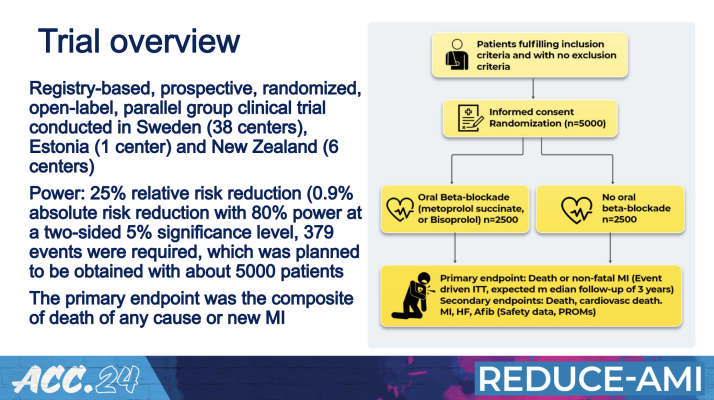
April 8, 2024 — Taking beta blockers after a heart attack did not significantly reduce the risk of death or a second heart attack among people with normal heart pumping ability, as indicated by an ejection fraction of 50% or higher, according to a study presented at the American College of Cardiology’s Annual Scientific Session.
The findings call into question the routine use of beta blockers for all patients following a heart attack, which have stood as a mainstay of care for decades. Approximately 50% of heart attack survivors do not experience heart failure. Among such patients, the study found no difference in the composite primary endpoint of death from any cause or new non-fatal heart attack between those who were prescribed beta blockers and those who were not.

Troels Yndigegn, MD
“I think that, following this study, many doctors will not find an indication to routinely treat all their patients with beta blockers following a heart attack,” said Troels Yndigegn, MD, interventional cardiologist at Lund University in Sweden and the study’s lead author. “We believe that the evidence still supports beta blockers for patients with a large myocardial infarction that experience heart failure, but for patients with no signs of heart failure and a normal ejection fraction, this trial establishes that there’s no indication that routine use of beta blockers is beneficial.”
Heart failure occurs when the heart muscle becomes too weak or stiff to pump blood effectively. It is primarily assessed in terms of left ventricle ejection fraction, which is the proportion of blood pushed out of the heart’s left ventricle with each heartbeat. An ejection fraction above 40%–50% is considered normal.
Beta blockers lower blood pressure by inhibiting certain hormones, such as adrenaline, that speed up the heart. Many clinicians prescribe beta blockers to all patients following a heart attack, typically for at least a year or often for the rest of the patient’s life, based on evidence that they can help to prevent a second heart attack. However, researchers said that the clinical trials that led to this routine use of beta blockers were conducted before the advent of many newer procedures that are now widely used to open blocked arteries.
“At that time, the damage to the heart muscle was greater than we see today, and we didn’t have the possibility to revascularize patients with percutaneous coronary intervention and stents like we do today,” Yndigegn said. “What we see today is more myocardial infarctions that are smaller and that do not damage the heart muscle to the same extent.”
To elucidate the potential benefits of beta blockers considering this changed landscape, the REDUCEAMI study enrolled 5,020 patients treated for an acute heart attack at 45 centers in Sweden, Estonia and New Zealand who participated in the SWEDEHEART Registry. All patients had an ejection fraction of 50% or higher as assessed with an echocardiogram performed within one week of their heart attack. Half were randomly assigned to receive long-term beta blocker medications and the rest did not take beta blockers.
Over a median follow-up period of 3.5 years, there were no significant differences between groups in the rate of the composite primary endpoint or in secondary clinical endpoints such as heart failure, atrial fibrillation or symptoms like chest pain and shortness of breath. There were also no differences in safety endpoints such as stroke, abnormally low blood pressure or fainting.
Researchers said that the lack of benefits associated with beta blockers observed in this patient group could potentially free many patients from the burdens of taking these medications, allowing them to avoid side effects such as mood disorders, fatigue and sexual dysfunction.
“Many patients report side effects or suspected side effects with these medications, so I think this finding will have an impact for thousands of patients,” Yndigegn said.
The study did not involve a placebo control and participants knew which group they were assigned. While this unblinded approach could potentially introduce bias, researchers said that this was not likely to have an effect on outcomes such as death and heart attacks. Yndigegn said the results should be generalizable beyond the population in which the study was conducted and added that other observational studies are underway that can help shed light on the routine use of beta blockers across diverse populations.
The researchers plan to separately analyze outcomes related to quality of life and sexual health. The study was funded by the Swedish Research Council, Swedish Heart Lung Foundation and Stockholm County Council. This study was simultaneously published online in the New England Journal of Medicine at the time of presentation.
For more information: www.acc.org


 July 31, 2024
July 31, 2024 









